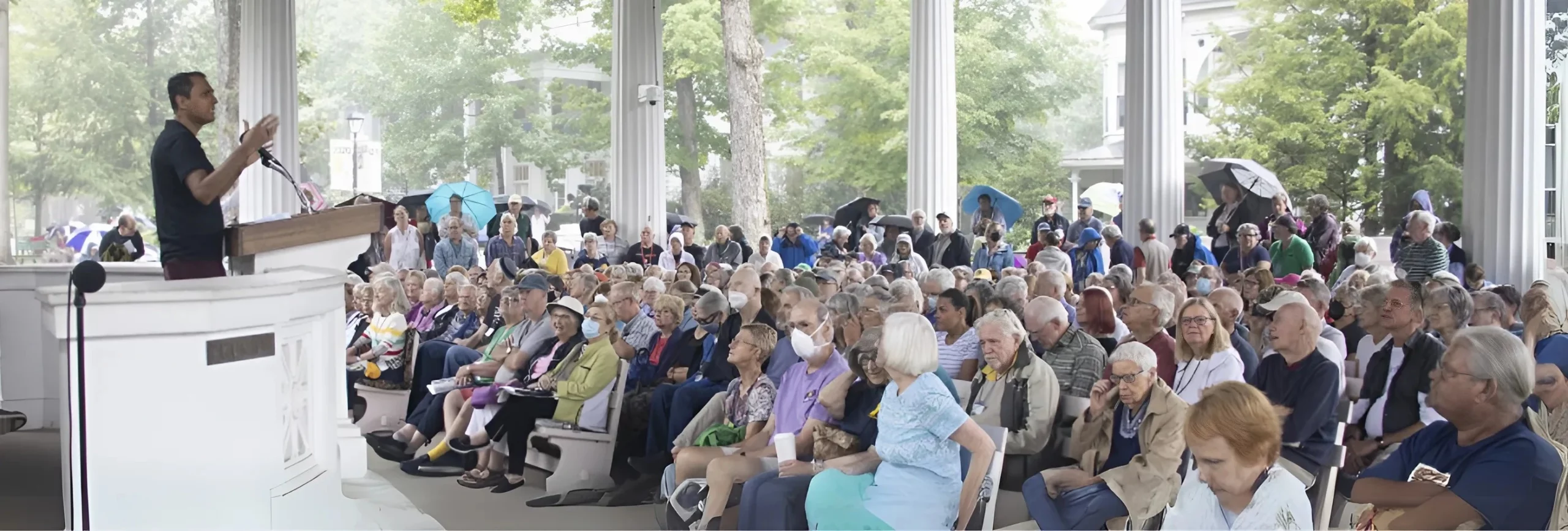(January 26, 2025) Can religion play a unifying role in society? For young Eboo Patel who was growing up in America, the answer was a resounding yes. “It can and it has to!” It drove him to start the Interfaith Youth Core (IFYC) in 1998 at just 22. It was a vision that would later grow into Interfaith America, one of the nation’s leading organisations for interfaith cooperation.
Patel, a trailblazer in inclusivity, is partnering with over 600 colleges and universities, governments, private companies, and civic organisations to make faith a bridge of cooperation rather than a barrier of division. He has served on President Barack Obama’s Advisory Council on Faith-Based and Neighbourhood Partnerships and authored five influential books.
The Indian American views the changing landscape of religion in America and its diversity not as a ‘melting pot’ or a ‘battlefield’, but as a ‘potluck’.
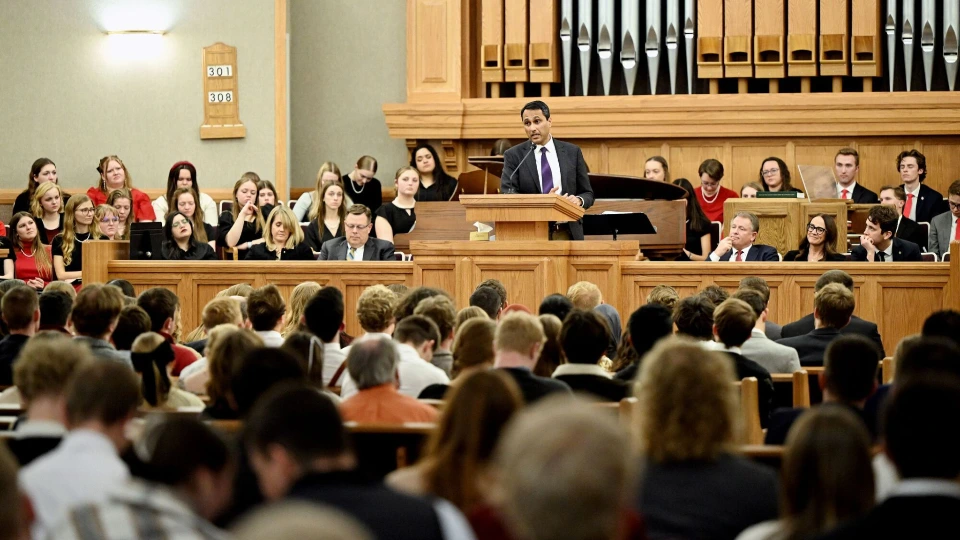
Eboo Patel speaking at a devotional at the Institute of Religion, Utah in 2024 | Photo Credit: Deseret News Publishing Company
Enduring racist bullying while growing up
Born in Mumbai, in 1975, Ebbo (short for Ibrahim) moved to the United States as a toddler when his father enrolled in the MBA program at the University of Notre Dame. But growing up in the Chicago suburbs wasn’t easy. His brown skin, Muslim faith, and Indian roots often made him feel like an outsider. He endured racist bullying that tested his faith and identity during his formative years.
Decades later, he is advancing harmonious coexistence among people of all religions and backgrounds as the Founder and President of Interfaith America.
The goal is not a more ferocious revolution. It is a more beautiful social order.
Eboo Patel on his initiatives
The man who was named one of “America’s Best Leaders” by US News & World Report in 2009, has recently received the Newsweek-Stubblefield Institute Civility Award in the category of Community Leader.
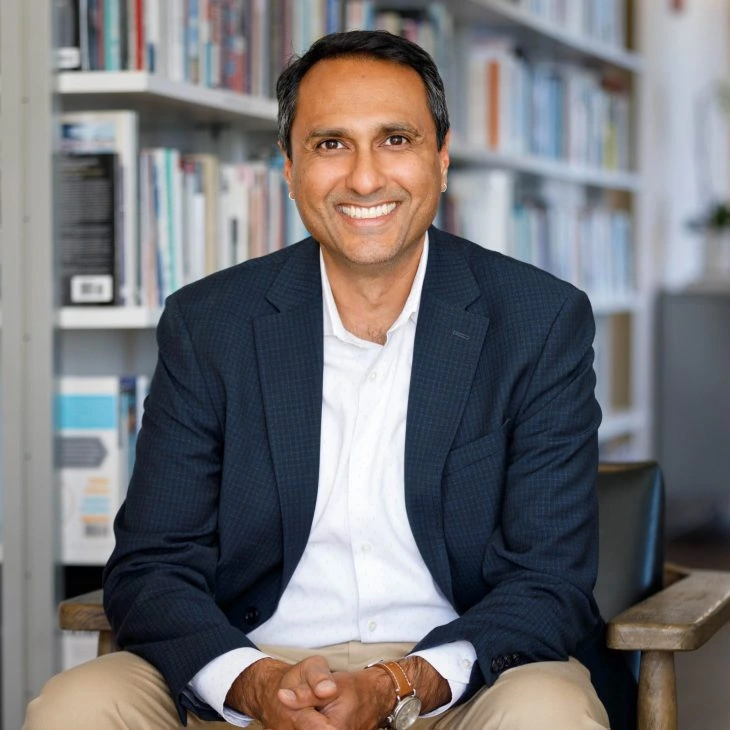
Eboo Patel
Making America a potluck of faiths
Through his nonprofit, Interfaith America, Eboo Patel’s mission is to “inspire, equip, and connect” communities and leaders to embrace the richness of religious diversity. His vision has been to channel the positive energy of people from all faiths—Hindus, Christians, Muslims, Jews, Buddhists, and more into building bridges of cooperation. He seeks to transform religious conflict into collective action, inspiring college students and professionals from all backgrounds to come together through meaningful service projects. The job of his institution as he puts it “is to help the nation that has not yet realized it is ‘interfaith America’ to realize it”.
Founded in 2002, Interfaith America has grown from a modest nonprofit in Chicago into the nation’s leading interfaith organisation. With a research-based approach, the organisation works across various sectors, including higher education, healthcare, corporate, civic engagement, and bridge-building initiatives. It provides expert consultation, training, curricula, and resources to foster positive engagement with religious diversity. Collaboration is at the heart of its work, as Interfaith America builds strong institutional partnerships as a proven method for addressing societal challenges.
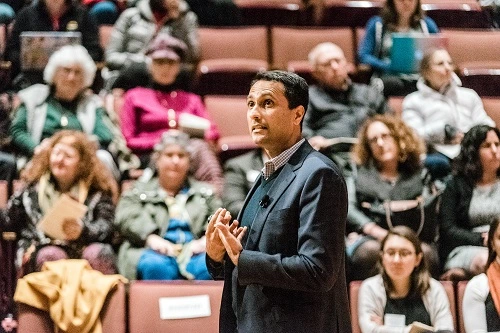
Eboo Patel during a lecture at Dickinson College in Carlisle, Pennsylvania
Early leanings
Eboo Patel’s interest in religious diversity began during college when he observed that discussions about multiculturalism and multiple identities often excluded religious identity. After graduating, he taught at an alternative education program for high school dropouts in Chicago. Inspired by the American journalist, social activist Dorothy Day’s Catholic Worker movement, he established a cooperative for activists and artists in the city’s Uptown neighbourhood.
As an activist, young Eboo Patel recognised the importance of diversity, service, and faith in civic life but found no organization that combined all three, particularly one focused on young people. This realization led him to envision the Interfaith Youth Core (IFYC), an idea shaped by his mentorship with Catholic monk, author and teacher Brother Wayne Teasdale. The IFYC aimed to unite young people of various faiths through service and dialogue.
In 2002, he formally established the IFYC with a Jewish friend and an initial $35,000 grant from the Ford Foundation. Later the organization’s name was changed to Interfaith America as it aligned better with the purpose of the non-profit.
Inspirations that shaped his voice
It was during his time as a college student at the University of Illinois that Eboo Patel first encountered the work of Dorothy Day, the Catholic activist and founder of the Catholic Worker movement. In one of his books, he recalls being “intoxicated” by Day’s vision and the relentless dedication of her followers to serve the poor in God’s name. Inspired by her example, Patel spent time volunteering at Catholic Worker houses across the country, directly engaging with her mission.
“Dorothy Day is my first interfaith hero,” Patel says, even though his admiration extends to a diverse group of leaders, including Mother Teresa, Cardinal Joseph L. Bernardin, Martin Luther King Jr., Mahatma Gandhi, Rabbi Abraham Joshua Heschel, and Aga Khan.
Honour the ‘Holiness of Diversity’.
Eboo Patel
After completing his studies at the University of Illinois, Patel went on to earn a doctorate in the sociology of religion from University of Oxford on a Rhodes Scholarship in 2002. During his time at Oxford, he coordinated numerous interfaith youth initiatives across India, Sri Lanka, and South Africa. Although he follows Islam as his religion, he believes in respecting all faiths in a “nation built on religious pluralism”. His goal has always been to follow the moral compass and show respect to all religions, instilling these qualities in youngsters.
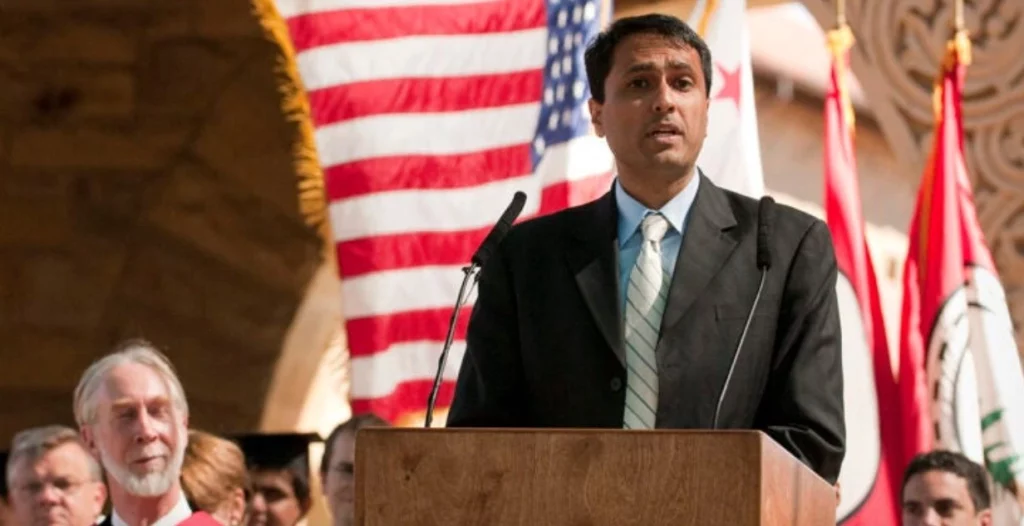
Eboo Patel addressing the Stanford University Class of 2010
Getting blessings from Dalai Lama
In his early 20s, while Eboo Patel was establishing the Interfaith Youth Core (IFYC), he was also exploring Buddhism, searching for a deeper understanding of himself and his purpose. During that time, he got an opportunity to meet the Dalai Lama. The young Eboo was eager to explain his vision to the spiritual guru. However, the Dalai Lama began by asking Patel about his own spiritual journey before discussing IFYC.
Caught off guard, Patel admitted he wasn’t sure about his religious identity, mentioning only that his ancestors were Muslim. The Dalai Lama, speaking from his experiences of growing up in Dharamsala, shared his admiration for Islam and his friendships with Muslims. Patel recalls that with gentle encouragement, the Dalai Lama told him, “Be a good Muslim.”
Years later, Patel got an opportunity to meet the Dalai Lama again in the United States in one of the conferences. He told the spiritual guru, “It was you, a Buddhist monk, who showed me my path and affirmed my purpose. The dream that I shared with you 12 years ago, we are building it.”
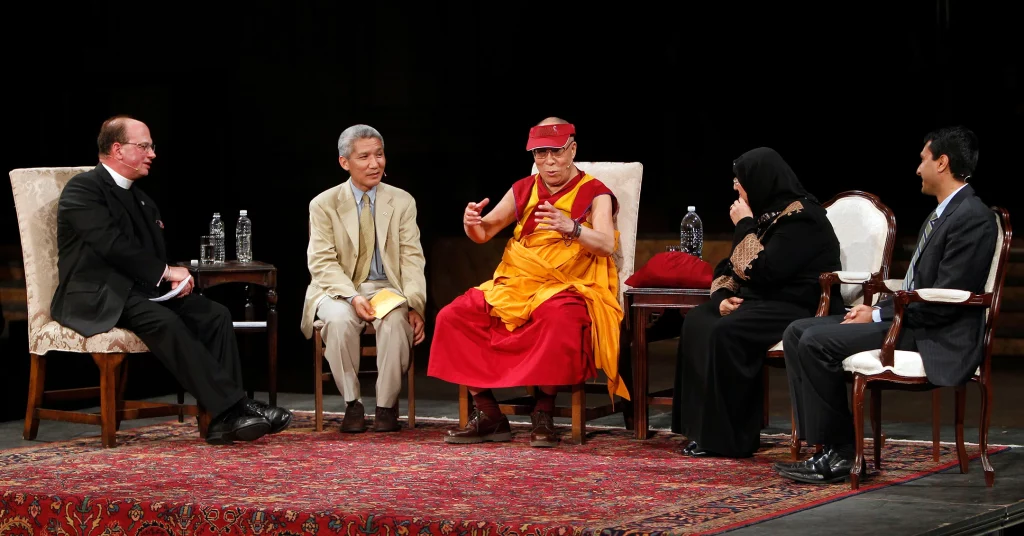
The Dalai Lama (centre) and Eboo Patel (extreme right) with dignitaries at an interfaith dialogue at Church of St. John the Divine in 2010, in New York City
We are better when we work together
Eboo Patel passionately believes that Interfaith America holds the key of advancing deep connections by truly understanding one another. In a world often marked by conflicts between people of different faiths, Patel poses a simple yet transformative question: “Why not work together instead?” He firmly advocates that collaboration across faith lines not only resolves division but also makes us stronger because we are better when we work together.
- Read More Fascinating Stories
